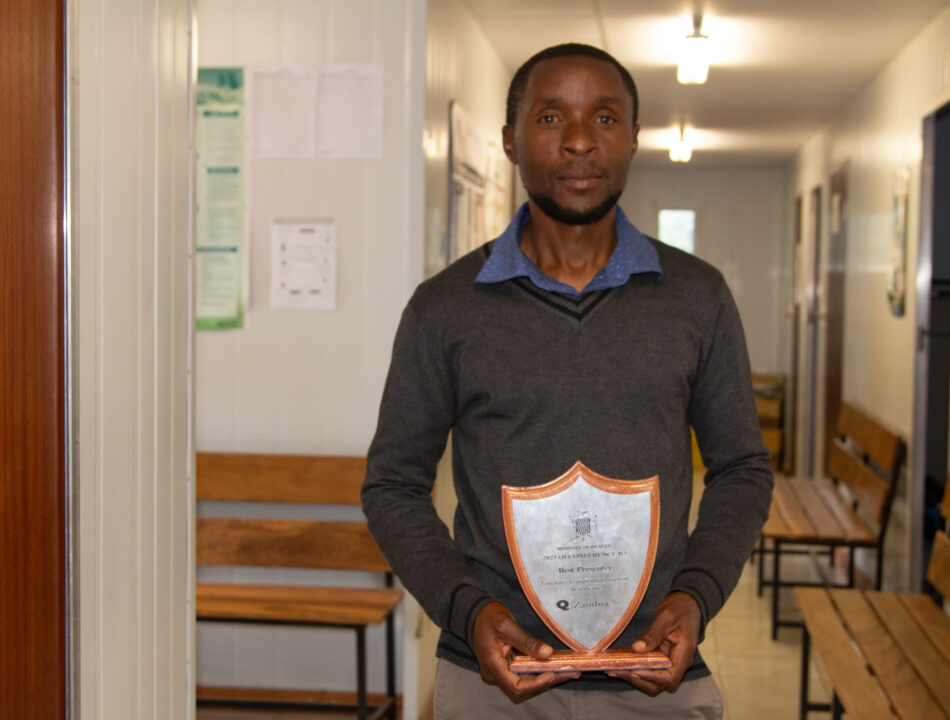
CIDRZ DONATES VARIOUS ITEMS TOWARDS THE FIGHT AGAINST COVID -19
April 20, 2020
CIDRZ Granted USAID Contract to implement Tuberculosis Local Organization Network (TBLON) Project
June 12, 2020For Charles Siisi, everything he had heard about index testing pointed to the fact that it was not doable and that it was hard to find index clients and not to talk about linking them to care.
“Index testing is not for everyone, it’s not about sexual contacts only, it requires commitment and passion and continuous skills development to succeed” a confident Charles Siisi, Community Liaison Officer at the Centre for Infectious Disease Research in Zambia (CIDRZ) stresses.
CIDRZ through support from the U.S. President’s Emergency Plan for AIDS Relief (PEPFAR) and the Centers for Disease Control and Prevention (CDC), working in close collaboration with the Ministry of Health (MOH), has embarked on accelerating responses towards reaching HIV epidemic control by 2030. Zambia has adopted the 90:90:90 UNAIDS targets to identify 90% of people living with HIV (PLHIV); 90% of PLHIV initiated and retained on antiretroviral therapy (ART) and 90% of PLHIV becoming virally suppressed.
CIDRZ is implementing various interventions to reach the 90:90:90 targets among them index testing. The goal of index testing is to break the chain of HIV transmission by offering HIV testing services (HTS) to persons who have been exposed to HIV and linking them to: HIV treatment, if positive or prevention services if negative.
Index testing is a voluntary process where counsellors or health care providers ask a newly diagnosed HIV positive client or an HIV positive client already accessing HIV treatment to list all partners who could have been exposed to HIV through them. With consent from the individual who is HIV positive, each listed partner and child is contacted, informed that they have been exposed to HIV, and offered voluntary HIV testing services. Index testing is consensual, confidential,  includes counseling, correct test results and connection to treatment or prevention services.
includes counseling, correct test results and connection to treatment or prevention services.
Charles’s Experience
“I endeavor to fulfill the commitments I make to clients such as confidentiality and friendship with them continues even outside the health facility. I visit them whenever I am free or when I am within their neighborhood offering the service to other clients. My sessions are more interactive and done within the client’s environment; all aimed at making the client feel appreciated and valued. If I am visiting them and find them doing their chores, I help them and use the opportunity to talk about HIV/AIDS prevention, testing and care services.
Charles says that when he joined CIDRZ as a Peer Educator, he found it difficult at the beginning to get consent from clients to have their sexual partners contacted. “But through continuous training and mentorship, I learnt new counselling skills and also learnt that being polite, respectful and honest was important when conducting index testing. I learnt that for one to be successful, they had to put their personal desires aside and focus on how they would help clients know their HIV status and encourage them to help their loved ones know their status”.
His strategy
“I visit clients as a friend and not as a health care provider. This helps to win the client’s trust. For example, I use games and real life experiences to get the information I need from them. The aim should be to encourage clients to have those they feel could have been exposed to HIV to be tested and also ensure that they (clients) remain on antiretroviral therapy (ART). I don’t focus on sexual and biological contacts only, but I also work with clients who could have been exposed through other means of transmission other than sexual contact”.
His Passion for Work
“I was fully aware of the challenges that index testing had to offer and I had to prepare myself adequately both mentally and physically, many clients live in places of about 5-8 hours walking distances but I never get deterred from going to offer them a service. Tracing contacts is a challenge but I use weekend outreach activities, public holidays and public gatherings to trace index clients as well as offer testing services to new clients”.
Charles is based in Western Province where CIDRZ with support from PEPFAR and CDC has been implementing health related activities focusing on HIV/AIDS.





1 Comment
Very interested